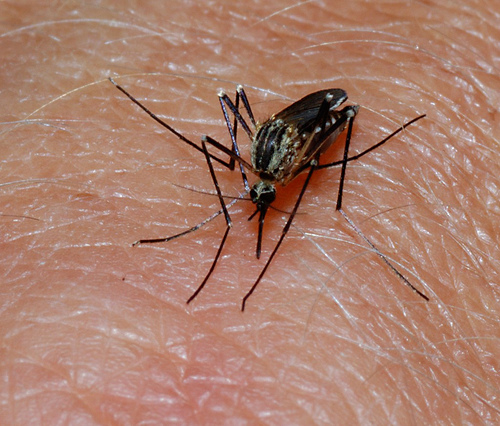You know how it goes: you’re in your kitchen, happily chopping veggies for that night’s meal, when an ant comes wandering by to check out the menu. Or you turn on the light in the bathroom and spot a silverfish scuttling away. Or you finally lie down for a well deserved rest, only to be plagued by the incessant whine of a bloodthirsty mosquito.
 This sucks.dr_relling via flickrThere’s a reason they’re called pests, and modern science has come up with plenty of sprays, baits, and potions to kill them or keep them at bay. But those remedies aren’t just bad for the bugs, they’re bad for you, too. Conventional pesticides contain toxic ingredients that can, according to the EPA, affect the nervous system, cause skin and eye irritation, affect hormones and the endocrine system, and cause cancer. As the New York State Department of Health delicately puts it, “The improper storage, application, or disposal of pesticides present potential health risks to the entire family, especially children.”
This sucks.dr_relling via flickrThere’s a reason they’re called pests, and modern science has come up with plenty of sprays, baits, and potions to kill them or keep them at bay. But those remedies aren’t just bad for the bugs, they’re bad for you, too. Conventional pesticides contain toxic ingredients that can, according to the EPA, affect the nervous system, cause skin and eye irritation, affect hormones and the endocrine system, and cause cancer. As the New York State Department of Health delicately puts it, “The improper storage, application, or disposal of pesticides present potential health risks to the entire family, especially children.”
Yuck. So are there alternatives?
The short answer is yes. The longer answer is, it might take some experimenting on your part to find out what really works. Here are a few “natural” suggestions people seem to swear by; leave your own solutions in the comments section below.
ANTS
Get out: Things ants do not dig include citrus, mint, cinnamon, cucumber, dried chili pepper, and paprika. Try spraying or sprinkling these in anty areas. Other effective combat-ants include diluted liquid soap or boric acid (but keep the latter out of the reach of children and pets).
And stay out: Keep ants away by storing food in tightly closed containers, vacuuming crumbs, and putting pet food away for the night. Try spraying their usual pathways with a citrus-derived cleanser or vinegar. Some swear by the use of dry grits — ants apparently explode after eating them. Whatever sits easiest with your conscience.
BEDBUGS/ DUST MITES
Get out: Heat is the best weapon against these pesky critters; wash infested items in hot water or seal in plastic and place in the sun.
And stay out: Vacuum and wash bedding regularly, and clean up clutter. When buying used furniture, examine it thoroughly — and when it comes to mattresses, you can cast your “secondhand only!” rules aside.
EARWIGS
Get out: Two “natural” traps include a clean cat-food or tuna can filled with water and vegetable oil (if you can stomach a can full of drowned earwigs) or a damp, rolled-up newspaper (they’ll crawl inside to escape the heat). Or sprinkle boric acid or diatomaceous earth along known thoroughfares.
And stay out: Seal cracks in windows, doors, and screens, and remove wood piles or leaf piles by your house (earwig he love the damp and dark). Put up birdfeeders to entice more feathered friends to visit — they’ll spot the earwigs and chow down.
FLEAS
Get out: There are a few herbal remedies said to work for dogs (though they may not be safe for cats): spray diluted eucalyptus, rose geranium, or tea tree oil on your dog’s fur. Rub diatomaceous earth powder on your pet, or use an herbal shampoo. Or comb your pet’s fur with a comb dipped in soapy water, then freeze the water to kill the fleas — just warn your ice cream-hunting roommates first.
And stay out: Vacuum carpets and furniture frequently. And if you’re really up for an adventure, spray your yard with freeze-dried nematodes; the tiny worms eat flea larvae. Yum!
FLIES
Get out: Deterrents include citronella, pine oil, eucalyptus, cloves, basil, and bay leaves. And you can make your own flypaper by spreading a mixture of boiling water, corn syrup, and sugar on strips of brown paper bags! If you’re feeling really sadistic, suck flies up with your (solar-powered) hairdryer and listen to ’em fry.
And stay out: Cover trash with a tight-fitting lid, and remove it regularly. Keep an especially close eye on compost and your fruit bowl — your bruised pear is a fertile fly’s dream.
LADYBUGS
Get out: They’re harmless, and they eat other pests — so don’t be too quick to get rid of them. But if you’re tired of a windowsill full of ladybugs, you can ward them off with essential oils (eucalyptus, lavender, cedarwood, etc.), lemon, or ammonia.
And stay out: Make sure screens are intact and properly sealed. The magical diatomaceous earth can come in handy here — sprinkled around the perimeter of your house — and planting cilantro, fennel, dill, and geraniums can help keep the ladybugs happy in the garden instead of seeking sustenance in your home.
MOSQUITOES
Get out: Ye olde essential oils come in handy once again; apply them straight, or look for natural insect repellents that contain them. Citronella candles or torches are a tried-and-true method for outside gatherings. And inside, sometimes just turning on a fan can do the trick.
And stay out: Make sure screens are intact and sealed. Remove standing water from gutters, pet dishes, toys, wheelbarrows, plant saucers, etc. Spray garlic oil on the shrubs and plants around your yard; this step is said to repel mosquitoes for up to four weeks. Of course, it might also repel your friends.
SILVERFISH
Get out: Plant-based repellents include cucumber (try placing strips or peelings in cabinets, closets, and basements, replacing them when they dry out), camphor, rosemary, cloves, and costmary. If you’re feeing trappy, set out a glass container with tape on the outside — the tape gives them enough traction to climb in, but leaves them with no way out.
And stay out: Like earwigs, silverfish thrive in dark, damp environments. They also think wallpaper paste is a mighty yummy treat. So repair or replace old wallpaper, seal cracks in walls and floors where possible, and consider a dehumidifier.
SPIDERS
Get out: They might creep you out, but most spiders are harmless — and are actually a good bet for keeping other insect populations down. Still, if you’d prefer to keep your house web-free, spraying a citrus essential oil in spider-prone areas can help keep them out. Placing chestnuts on windowsills and around exterior walls could also do the trick.
And stay out: Clean up clutter — especially wood and cardboard, which spiders find quite alluring. Dust regularly. But mostly, get over your arachnophobia! Ultimately, spiders might be the best form of non-toxic pest prevention you can find.
For more extensive advice on green pest control, check out these suggestions, or these.



